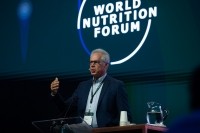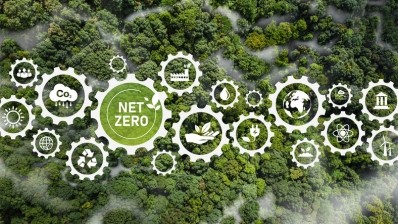Dispatches from the World Nutrition Forum 2023 in Cancun, Mexico
Former McDonald's executive: 'Sustainability is not a threat, but an opportunity to grow the business'
Bob Langert, retired VP of CSR and Sustainability, McDonald’s Corporation, was one of the keynote speakers at dsm-firmenich’s conference, the World Nutrition Forum 2023, held last week in Cancun, Mexico.
Back in the late 1980s, there was no language or concept really of sustainability, he said. In that era, the definition of social responsibility was that articulated by business guru, Milton Friedman: ‘The purpose of a company is to its shareholders, in other words, profit.’
“But, in the past three decades, corporate social responsibility (CSR), sustainability, and ESG has evolved way beyond what I thought was possible—into a mainstream business function,” continued Langert.
The transition to more sustainable business took on an even greater momentum, he noted, when, in 2019, during the Business Roundtable, the titans of American business, such as Jamie Dimon, Mary Barra, Tim Scott, Jeff Bezos et al declared a different vision of the corporate world: one that was aimed at serving relevant stakeholders, customers, and the community—to have a purpose.

A growing number of companies have sustainability officers, staff, and CSR type reports, said Langert. “They are demanding more of suppliers. The leadership companies are being proactive. They see sustainability not as a threat, but as an opportunity to grow the business. Therefore, leading companies are integrating sustainability within the company, making it part of their culture and values, and placing it within the C-suite.”
Some companies have not yet grasped the nettle on CSR
At the same time, many businesses are struggling with how and when to communicate what they do, stressed the former McDonald's sustainability lead.
“Most companies have not found the right way to connect with their stakeholders on sustainability issues and see marketing ESG as creating a target on themselves. Even though there is a convincing case that ESG is good for the brand and reputation, most companies fail to seize the opportunity to resonate with consumers who widely care about how companies treat people and planet.”
In the food and agriculture business, sustainability issues are magnified even more than in other industries. “That is because food is something very personal. It is digested into our bodies and carries with it sustainability relevance far exceeding computers, cars, and construction. Research has shown that consumers want natural, wholesome food and drink that is real and authentic. Research also shows that how companies and their food products care for people, planet and animals has a significant halo effect on food perception as more nutritious and good for me.
“When I retired from McDonald’s in 2015, more than two-thirds of our customers did not feel good about our food. That is not sustainable, most food companies share this challenge.”
‘Make your critics your friends’
Companies are looking for people to lead this next stage of corporate sustainability, according to Langert. “The past 30 years has largely been filled with playing defense and staying out of trouble. Now, the leading companies are playing offense, and they need people within their organization and supply chain to take the strategies in place, and the lofty goals established, to actually make things happen, get things done.”
In order to meet sustainability objectives and to enhance a company’s brand and reputation, Langert emphasized that it is critical to make your critics your friends.
Case-study: Working with the EDF on waste
Recalling how he and his colleagues first set about transforming McDonald’s packaging waste, he said they decided to engage with the US based non-profit, the Environmental Defense Fund (EDF), to help them do so. It was the start of a series of critical alliances between the fast-food giant and leading civil society organizations and other partners.
In the late 1980s, McDonald's faced public pressure to reduce its packaging and waste. The EDF and the company began a groundbreaking partnership to reduce McDonald's solid waste. The project team analyzed McDonald's US operations, including restaurants, distribution centers and suppliers, looking at ways to reduce, reuse and recycle as much as they could. The impact of that alliance was that over the next decade, McDonald's eliminated more than 300 million pounds of packaging including the polystyrene clamshells used to package its burgers, it recycled one million tons of corrugated boxes and reduced restaurant waste by 30%. As a result of these and other changes, McDonald's saved an estimated $6m per year.
Managing the whole supply chain: Animal welfare
Businesses need to manage the whole supply chain, he continued.
In the 1990s, McDonald's was a target for animal rights organizations. “We are one of the biggest purchasers of meat. We should have had a welfare policy, but we didn’t back then. Our mindset was ‘well that is our suppliers’ job.’ Though, we did not even know what our suppliers were doing [in terms of] handling the animals.
“My boss told me I had to come up with a program. We were willing to open our minds and work with our critics. While PETA was highlighting [animal welfare] issues, we decided we needed to work with someone that actually had a solution.”
So, in the late 1990s, the company established a partnership with renowned animal welfare expert, Dr Temple Grandin. She set about auditing its meat providers, with McDonald’s eventually adopting her animal welfare scoring system - “She is what a critic can be. She is critical of industry when they don’t do the job. But she is not out to destroy the industry. They are the best types of critics to work with.”
Transparency
Langert said that, today, the corporate world is at a new threshold where stakeholders are as important as shareholders, and how companies listen, manage, and serve their stakeholders in an important part of business success.
Companies also have to satisfy rising financial institutional investment interest, he stressed.
And transparency in business, the former McDonald's executive, is also key to achieving CSR goals. It means being open with stakeholders in the company and being open with customers. It is not hiding relevant data, it is being honest, and upfront.








